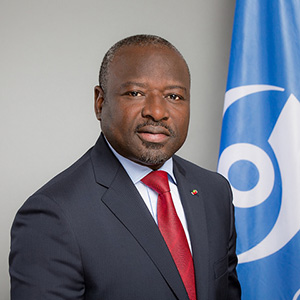
On 8 February 2016, the VCDNP co-sponsored an evening discussion featuring Executive Secretary Lassina Zerbo of the Preparatory Commission for the Comprehensive Nuclear-Test-Ban Treaty Organization (CTBTO). The event was held in collaboration with the U.S. Permanent Mission to the International Organizations and the U.S. Embassy at Vienna's Amerika Haus.

The event was focused on the CTBTO's recent work in detecting North Korea's announced nuclear test (its fourth, if confirmed) of 6 January 2016. VCDNP Executive Director Laura Rockwood provided opening remarks, explaining the background of the North Korean situation—the early days of its nuclear program; its grudging, short-lived membership of the Treaty on the Non-Proliferation of Nuclear Weapons; and its transition to a nuclear pariah state.
Following these introductory remarks, Dr. Zerbo took to the floor. He began his address by reflecting on the Comprehensive Nuclear-Test-Ban Treaty (CTBT) as a "victory of multilateral diplomacy" and spoke of its impact in curtailing nuclear testing around the world. He described the technical aspects of the verification regime of the treaty, that are comprised of the International Monitoring System (IMS) and the International Data Centre, which are responsible for providing Member States with the necessary information to determine whether an ambiguous event may have been a nuclear explosion. Dr. Zerbo explained that in January 2016 83 IMS seismic stations around the world detected the North Korean event, though conclusive proof that it was a nuclear test would require the detection of radionuclides. He noted that no IMS radionuclide stations had picked up unusual readings yet, but that it might still be too early for detection as radionuclides are carried through the air according to weather patterns, and may take a few weeks to reach an IMS radionuclide station. Seismographs shown, however, displayed remarkable similarities between the January event and previous, confirmed, North Korean nuclear tests.
Dr. Zerbo spoke also of the changing face of the CTBTO. Nowadays, he noted, there is a far greater demand for public information to be released by the organization, particularly from the media. This has led to the organization adopting a "more aggressive" outreach stance, lest politicians and the public question the organization's ongoing value and contributions.
Dr. Zerbo further commented on the "preparatory" nature of the CTBTO, arguing that the CTBTO is preparatory on paper only. He cited the recent example of his analysts pouring into their offices in the middle of the night once the North Korean event had been detected to work until morning getting data ready for presentation to the world. Hardly the level of commitment by staff of a "preparatory" body, he suggested. The CTBTO is in many ways functioning just as it would should the treaty itself be in force.
As for the likelihood of entry into force of the CTBT, Dr. Zerbo pointed to rapid and unforeseen changes as illustrative that nothing is predictable in global politics. He highlighted the example of Syria joining the Chemical Weapons Convention in 2013 amidst global outrage at its use of chemical weapons—but he warned against waiting for a crisis before taking the CTBT seriously.
Iran, one of the eight remaining Annex 2 countries that must ratify the treaty before it can enter into force, was also briefly mentioned. In Dr. Zerbo's view, the non-inclusion of the CTBT in the recent deal struck between Iran and the EU3+3 was a "missed opportunity". He recognized, however, that including provisions related to the CTBT would have complicated further an already complicated negotiation process, noting that the Joint Comprehensive Plan of Action (JCPOA) remained a good foundation for future consideration of ratification of the CTBT by Iran. Indeed, he suggested, the JCPOA could promote trust-building between States and encourage a possible joint ratification of the treaty by Iran and Israel, another Annex 2 State. Both countries now have "nothing to lose", he argued.
Returning to the recent North Korean event, Dr. Zerbo responded to the question "What was it?" relating to the January readings of an unusual event on the Korean peninsula, with the answer: "Is it important?" The details, he said, are less important than the fact that the CTBTO's verification system is working and able, night and day, year in, year out, to help detect any attempt to test and further develop nuclear weapons capabilities, anywhere in the world.